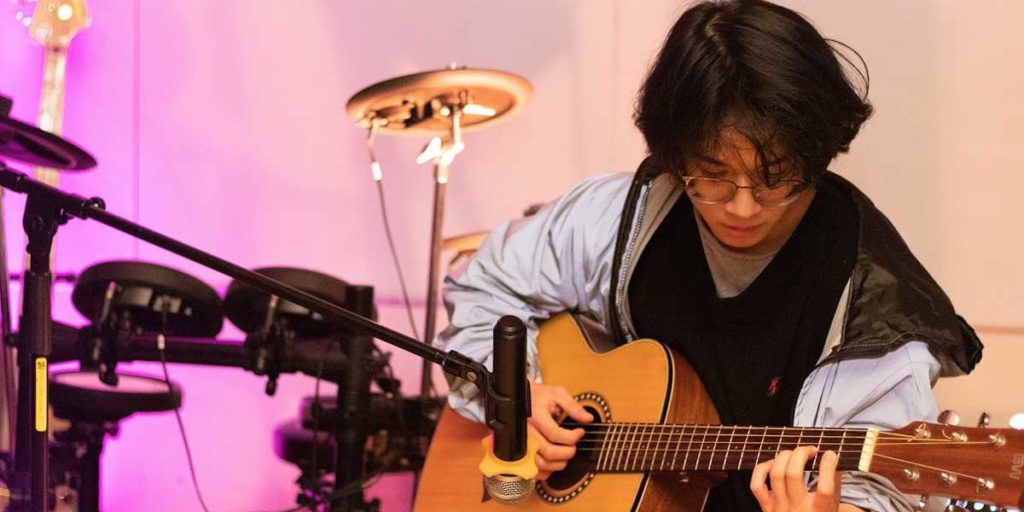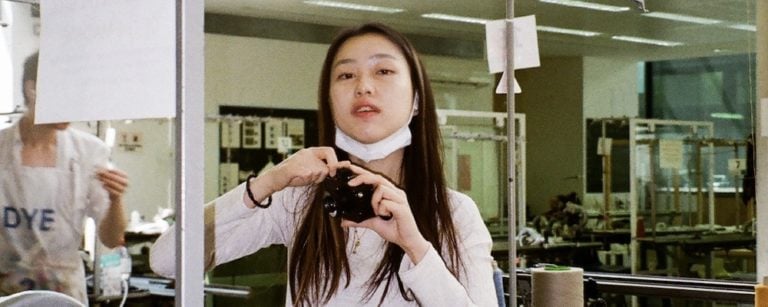The Arts
Home / Our High School / Academics / The Arts
UWC ISAK Japan’s arts programs cultivate creativity through visual arts, theatre, and film, allowing students to explore diverse mediums, experiment in performances, and balance theory with practice. Though music is not a formal academic course, it remains a significant aspect of campus life, encouraging students to express their musical talents and highlighting art’s essential role in education.
Art is not what you see,
but what you make others see.Edgar Degas
Visual Arts
Whether you’re an experienced artist or just starting out, our program is designed to meet your needs. With no requirement to be able to draw, you have the freedom to choose the medium that speaks to you, including photography, painting, 3D, printing, and screen-based art. In G11, you’ll explore different techniques and skills through set projects, and in G12, you’ll focus on creating a body of work for your exhibition. With access to digital tools like iPad Pros, Apple pencils, and Adobe Creative Cloud, you have the freedom to work digitally if you choose. The most important skills for success in this program are a love of creating and a willingness to take on the role of a young artist.
No, drawing can be a useful method of visual planning and communication, but there is nocomponent in Visual Arts that demands it.
Yes. The choice of medium for the exhibition is up to you. We will cover other forms of art making, such as 3D, printing, painting and screen-based in the first part of the course, but after that you specialize – and your specialism could be photography
In G11, there are a number of set projects exploring different mediums, techniques and developing skills. In all of these, there is always huge scope for personal interpretation. There are also two written components – a comparison of artworks, and a journal that documents your creative process. These are both worked on in G11, leaving the majority of G12 to work in the studio on the exhibition.
Attitudes are more important actually. You should enjoy making and being creative, and enjoy being able to choose what to do and how to do it. There is a lot of creative freedom, and students take on the role of young artists rather than traditional students.
Yes, you can choose to focus on digital art for your exhibition work. The Art Room iPAD PROs with apple pencils to support digital work, and all students have access to Adobe Creative Cloud, which includes programmes such as Illustrator and Photoshop. There is a large scale printer in the Art Room to allow digital work to be printed for exhibition.
Visual Arts at UWC ISAK Japan
Theatre
Embark on a thrilling journey of creativity and collaboration with IB Theatre at UWC ISAK Japan. This unique program offers the opportunity to produce live, original moments of art, taking risks, and experimenting. You will develop self-awareness, confidence, and analytical skills while understanding the major theories and traditions of theatre. The course includes three interconnected elements: Theatre in Context, Theatre Processes, and Performing Theatre. Explore the major processes of theatre, including creating, designing, directing, performing, and spectating. Writing is an integral part of the course and the journal is a critical tool for all aspects of theatre processes. With a balance between performance and theory, the course is challenging but highly rewarding.
Theatre offers the unique opportunity of working creatively and collaboratively to produce live, original moments of art. Studying theatre in the IB DP is about taking risks, discovering through experiment, researching and applying knowledge of global theatrical traditions and theories, presenting ideas to others through live theatre, and reflecting on the process of making theatre. Taking theatre will help you develop greater self-awareness and confidence, hone your analytical skills, understand the major theories and theorists of the theatre, show you the dynamic and changing nature of art, and nurture a lifelong love of theatre arts.
The course is composed of three interconnected elements:
- Theatre in Context
- Theatre Processes
- Performing Theatre
These elements will be found in every aspect of the course and assessment pieces. This means that we will always strive to move from foundational understandings of the environments out of which theatre is developed to theories that undergird the art form, and from those theories into practical application in our own work.
A central part of the course and a critical aspect of collaborative work will be an engagement with the major processes of theatre. These include:
- Creating – devising original works, ideating with established play texts
- Designing – exploring mise-en-scene, light & sound design, set design, costumes and props
- Directing – determining and executing a vision for a moment of original or established theatre
- Performing – exploring movement, voice, facial expression, gesture, and action
- Spectating – reading, analysing, critiquing and responding to live theatre
All students will have the opportunity to explore these areas in practical ways through
units, activities, and assessments which push their creative and critical abilities.
While innate acting talent may seem a necessary (or at least helpful) attribute for succeeding in IB Theatre, it is your ability to take risks, to analyse, to be open to new approaches to expressing ideas on stage, to work and play positively and collaboratively with others that will best serve you.
Nope! While rehearsals are an essential part of theatre and we will work on projects that culminate in live performance, we will also engage in other tasks including:
- Play text analysis
- Research into world theatre traditions
- Study and application of theories of theatre
- Design and set construction
- Costume, prop, mask, and makeup design
- Technical experience with sound, lights, and projections
Theatre at UWC ISAK Japan
Film
IB Film class is a unique and fun learning experience that allows you to understand, analyze and contribute to the visual language of film. Whether you’re creative or not, you will be taught from the basics and become a critical thinker and problem-solver. The class balances theory and creation, with a mix of history and lectures, film analysis and discussion, and hands-on film experiences through various assignments and projects. Everyone gets to create their own films and apply their acquired knowledge, making the class a fulfilling journey.
By taking this course, you will be able to understand, analyze and contribute to the visual language that surrounds us on a daily basis. Film is a powerful medium to communicate ideas, and studying it leads to a deeper insight into the ideas that film coveys, and the way in which those ideas are told. Film is relevant to a myriad of subjects; at times, film class feels like it could be English, History, TOK, or Global Politics class. The interdisciplinary connections one is able to make in film class is part of the reason why the class is so unique.
To me, film class is the study of how meaning and purpose are conveyed through visual language.
There are no prerequisites for IB Film – by taking this course you will learn how to make film and improve upon your skills over the two-year period, you will be taught ground up starting from the basics.
As long as you have a positive mindset and are willing to challenge yourself, you will be fine. Studying film requires you to be a critical thinker and a problem-solver. Creating film is enjoyable and satisfying, and is something everybody has the potential to do.
The class is quite fun and interesting especially with the hands on film experiences gained.
We study the history of film and learn how film is meaningful and powerful. Through that, we apply them to reality with quick assignments as well as summative project. Of course, we look at films and analyze them, enriching our knowledge in film and see the knowledge we studied applies in famous work.
Film at UWC ISAK Japan
Music
Although music is not a formal course at UWC ISAK Japan, it still thrives as a vibrant part of our school culture. Our campus is equipped with a variety of instruments and facilities for students to unleash their musical creativity. Moreover, students can join one of the many student-led music clubs and work alongside other musicians in the nearby Karuizawa area. Musicians showcase their skills through several performances each year at the renowned Ohga Hall, where fellow students are often invited to attend and perform in events.






